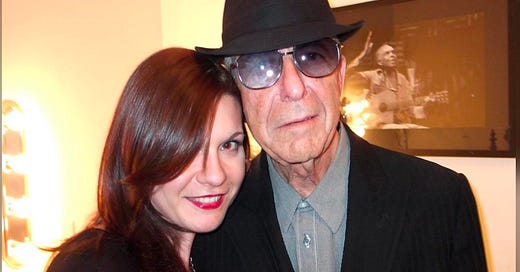In her book The Artist Way, Julia Cameron writes:
My grandmother knew what a painful life had taught her: success or failure, the truth of a life really has little to do with its quality. The quality of life is in proportion, always, to the capacity for delight.
The capacity for delight is the gift of paying attention.
Two of the traits I was born with are enthusiasm and inclination toward possibility. I actually am not sure I was born with them, but my memories of eagerness and positivity are very young.
At times, these traits of mine have been too much for the people around me; at times, they have been source of profound disappointment, of heartbreak, and most of all, of shame.
I have often felt ashamed of my enthusiasm for the things of life and for my tireless spirit of positivity and hope, to which I was loyal to even when all seemed lost, and that I used to hide under the blanket of self-harm.
It had not occurred to me, until I read Cameron’s quote, that my enthusiasm and optimism were gifts of the attention I paid to life, and that such inclinations had kept me afloat, at times alive. For delight isn’t just the striking resilience of a flower growing out of cement; delight is also possibility for positive action, that proverbial ‘crack’ Leonard Cohen sang about — through which light always gets in.

I still see delight everywhere I go, even during the dark times we are living.
I have tiptoed my way into writing this month’s reflections because it’s not easy to write about life when some of the worst fires in modern history have devastated entire neighborhoods in Los Angeles, when the refugee resettlement program has been halted, canceling travel for refugees that were already cleared for their arrival in the land of opportunities — hearing the desperation and the terror in their voice — on a recent NPR special — after they have risked their lives to fight the good fight alongside the United States in Afghanistan left me feeling wrecked.
Note: remember this space has always been (and will always be) a safe place for dialogue and understanding; so please do not see judgment in my words, rather an offer of facts (historical and current) and compassionate dialogue to find the common goal, the greater good.
It’s hard to write a newsletter from the safety of my home when basic human rights have been threatened or taken away from people I love, and when the richest men on the planet are now more emboldened than ever in their greedy pursuit for more.
Writing about what has happened in January without falling into a cliché is a delicate task.



But the darkness, the suffering, the toxicity and the loss that we are collectively experiencing bears acknowledging and addressing, in order to be navigated with purpose, with intention, with love.
Love, a cliché, I know. But maybe for a reason…
It doesn't matter whether the suffering takes place across the globe or across the street: when someone suffers, we all suffer. The repercussions of injustice, natural disasters, and greed have already spread throughout the fabric of society; they already affect all of us on one level or another.
We are all losing today: rich or poor, gay or straight, Democrats or Republican, black, white, or brown.
I began to write this piece on a cold morning, the one after the much awaited rain.
I was driving to the barre studio I attend twice a week, when I heard the story1 of an Afghan woman (whose name was kept secret for her safety) who had worked for years alongside the Unites States in Afghanistan, and who was now stuck in Pakistan, where she risks being sent back to her country (now ruled by the Taliban), where her life and her children’s life will be in danger, for having cooperated with “the enemy”. 2
Our leaders failed, we all failed.
In my car, still listening to NPR, I waited for the light to turn green; I looked at my surroundings, at the unburned trees around me, at the traffic light that worked and made the street a safe place along which to drive, at the bottle next to me, filled with clean water to drink, at my cold sore protected by a thick white ointment — a medication that I could afford to buy.
What can I do?
I said out loud.
That’s when I saw the first snow on the mountains, in the distance; it was a beautiful and much awaited sight that reminded me of where I grew up, of my childhood, of my inclination toward positivity and possibility.
I asked what could I do because I am angry and I feel helpless. But hate and blame have never been a viable tool albeit often the easiest one to reach. I have used them considerably in the past; they never worked.
Hate, judgment, and accusation will not help either this woman, or the family that barely makes it to the end of the month, the woman seeking an abortion, or the transgender kid that is afraid of being beaten on the street. Hate will not help the minority-owned business not given a fair chance at succeeding because many companies have been bullied into terminating their DEI program, a few days ago. Pointing the finger and raising my voice will not help the talented employee who happens to be a woman, or who happens to love someone of their same sex, and therefore is not hired for a job they deserve; blame will not help the thousands families in Altadena and Pacific Palisades who have lost everything in the January 7th fires.
What can I do?
I asked again, in a plead for guidance.
January 25th was my birthday, and as a present to myself I attended a day-long meditation retreat that focused on the Four Noble Truths, led by a dear friend of mine.
Very simply explained, the foundation of Buddhism say:
suffering is part of life
it has a cause
it can end
there is a path to end it
I am not a teacher, but I felt the responsibility to bring them into consideration to give context and a sense of possibility, a call to action to this newsletter: suffering (which isn’t an accurate translation of dukkha, the Sanskrit word for the first noble truth, and that is better translated as “unease”, perhaps) is a fact.
It’s a fact because we, as humans, tend to reject the ‘uneasy’ in pursuit of what is pleasant instead.
We can’t avoid pain, but we can stop suffering, I learned on my birthday.
We can stop suffering by embracing what is pleasant without grasping, and by accepting what is unpleasant without rejecting.
Once I arrived near the barre studio, that cold morning, I parked the car and stepped onto the wet asphalt; I remembered how much I have always loved the day after the rain. The air was crisp, my voice still husk from my recent laryngitis, my brain fogged, and my heart bruised from the news. But I smiled as I zipped my jacked closed, and added money to the meter.
What can we do to change the things that are wrong without being completely overwhelmed and exhausted?
Pause when agitated, I have learned over the years.
I don’t always do it, but I am pausing today. I am acknowledging the fear, the anger and the disappointment, until more clarity comes.
Not rejecting nor grasping means allowing the feelings to be: rise, peak, and fall — change, just like I learned to do with my migraines. By practicing this, when our call for action is clear, we are calm, focused on a goal, rested, prepared, compassionate.
For the feelings to be, however, for ideas to appear, for possibilities to be seen we must create space. And space is another gift of paying attention.
So I ask you to pay attention: to the colors of a sunset, but also to everything that is happening.
I am asking you to pay attention not as a victim of the times, but as an empathetic witness who — collectively — is affected by all that happens around you as well as on the other side of the world, to friends and neighbors as well as to far away strangers.
During the retreat, the teacher shared something she had heard from a physics, that tangibly explains the extent to which we are all interconnected — and therefore all affected by the events of life regardless of their zip code of occurrence.
Simply put:
Because the Earth is finite, matter is reused and recycled over and over again.
Today’s lunch, for me, was a salad with tuna fish. That tuna fish was caught by fishermen I don’t know, very far away from Los Angeles, where I live; it has been packaged and transported by workers I will never know, and it’s been arranged on the shelves of the grocery store by someone I have likely never met. The arugula I ate was planted, picked, and sold by a local farmer, put on the shelves by my friend Theresa, and thoroughly washed by my mother. I was alone in my studio, when I ate the salad — but aloneness and separation are tricks of the brain: at least six human beings were involved in making possible the food I ate. Furthermore, the atoms of that salad, of that tuna, went back into the ecosystem as my body performed what is biologically designed to do.
I am not naïve, what is happening is dark and dangerous. But if we all pause, before raising our voice and taking impulsive action, if we can look for the common goal — a happy and safe life of possibilities and equal rights — we all win.
Perhaps, this newsletter has turned out to be a cliché. But two of the traits I was born with are enthusiasm and inclination toward possibility.
ps. if it is in your financial possibilities, whether you are a Republican or a Democrat, please consider supporting public media like PBS and NPR, that today like never before are at risk of being defunded, and unjustly investigated; they provide culturally healthy entertainment and unbiased, fact-based news.
In February of 2020, the first Trump administration signed the American-Taliban deal pledging full withdrawal of U.S. troops; the task was inherited by President Biden in January of 2021, that he had to honor, and that turned out to be a big failure. Our leaders failed, we all failed.





I've felt helpless, too, but like with any task, I'm finding it's often best to start with small yet meaningful actions. giving time, energy, and resources where we can. not reinventing the wheel, but making the wheels that already exist turn more easily.
Wonderful!